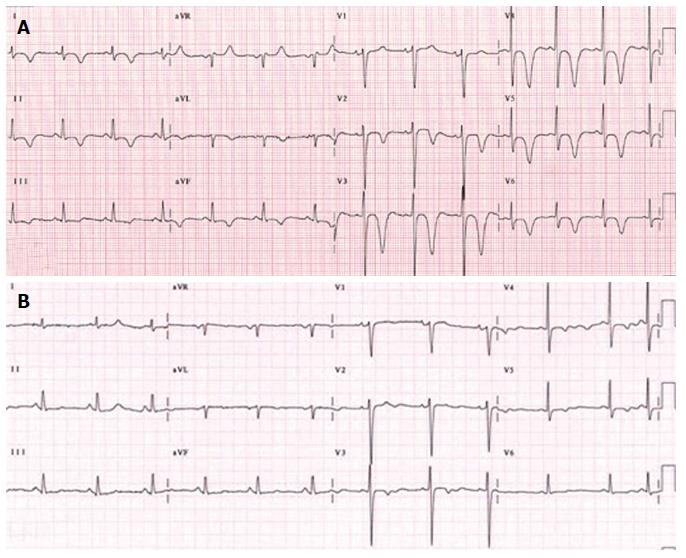Copyright
©The Author(s) 2015.
World J Cardiol. Feb 26, 2015; 7(2): 86-100
Published online Feb 26, 2015. doi: 10.4330/wjc.v7.i2.86
Published online Feb 26, 2015. doi: 10.4330/wjc.v7.i2.86
Figure 1 Patient 1.
A: An electrocardiographic (ECG) tracing, illustrating the negative T-wave in the precordial leads V2-6, of a 51-year-old-female patient presented with palpitation following electroconvulsive therapy for her depression. In 2001, she underwent catheter ablation for atrioventricular nodal reentry tachycardia. She complained of palpitation after a shock of electroconvulsive therapy for treatment of depression. Post-electroconvulsive therapy, the ECG showed giant T-wave inversion in the precordial leads. The cardiac enzymes were minimally raised. Takotsubo cardiomyopathy is suggested due to emotional stress and electrical shock. Transthoracic echocardiography demonstrated apical hypokinesia and basal normokinesia with trivial valvular regurgitation without massive pericardial effusion. The estimated right ventricular systolic pressure was 35 mmHg. Coronary angiography and cardiac magnetic resonance imaging demonstrated normal findings. Medical treatment with beta blocker was initiated and the symptoms disappeared and (B) the ECG returned to base line in 2 wk time. The antidepressant drug was not discontinued.
- Citation: Said SA, Bloo R, Nooijer R, Slootweg A. Cardiac and non-cardiac causes of T-wave inversion in the precordial leads in adult subjects: A Dutch case series and review of the literature. World J Cardiol 2015; 7(2): 86-100
- URL: https://www.wjgnet.com/1949-8462/full/v7/i2/86.htm
- DOI: https://dx.doi.org/10.4330/wjc.v7.i2.86









